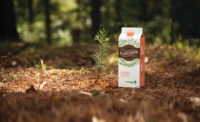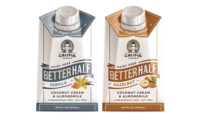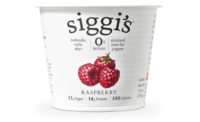Rigid packaging is a staple in the dairy case, but what’s stocked today differs from what consumers put in their shopping carts a few years ago. Containers have been lightweighted, sometimes with the help of in-mold labels. Clear containers are addressing consumer wishes for product visibility. And there are more single-serving cups, tubs and bottles to appeal to the popularity of snacking and portion control.
With rigid packaging evolving, the global molded plastic packaging market will experience a compound annual growth rate above 5% through 2020, according to London-based Technavio. Its report, titled “Global Molded Plastic Packaging Market from 2016 to 2020,” notes that polyethylene terephthalate (PET) is emerging as the most favored material due to clarity and versatility.
Many recent rigid packaging innovations focus on longer shelf life and renewable materials. One shelf life-extending technology from a German packaging supplier enhances the barrier of small PET containers and dovetails with growing demand for preservative-free recipes and single-serving products.
Products in smaller PET bottles tend to have a short shelf life due to high gas permeability caused by their surface-to-volume ratio. So the “best before” date for a product in a PET bottle with a volume less than 350ml (11.8 ounces) occurs much sooner than it would in an equivalent size can or glass bottle.
A machine from KHS Plasmax GmbH, Hamburg, Germany, applies a barrier coating to the interior of PET bottles ranging in size from 100ml to 350ml (3.4 to 11.8 ounces) to make it possible to lengthen shelf life without preservatives.
Applied by a patented plasma impulse chemical vapor deposition process, the wafer-thin, glass layer forms a virtually unbreakable bond with the PET. The layer is so thin that coated containers can be recycled with conventional PET containers with no negative effects.
With the InnoPET Plasmax 20QS machine, reduced-volume coating chambers boost throughput 20% versus the 20Q model, which handles container sizes larger than 350ml. With an output of 48,000 bottles per hour, the 20QS machine cuts the cost of small bottle formats. The barrier coating also permits lightweighting. Less resin per container lowers material consumption up to 30%, cuts PET processing costs and has a positive impact on freight costs. The coated bottles are suitable for products containing water, acid, high or low alcohol content, high pH or carbonation.
Seeking clarity
Although cans are not a common rigid packaging format for dairy products, the industry could see some new shelf-stable products with the introduction of the TruVue Can by Sonoco, Hartsville, S.C. The clear can depends on the company’s patented Fusion Freshlock Technology, a highly engineered, multilayer plastic substrate, which will withstand the rigors of continuous retort systems without overpressure.
More renewable
With brand owners continuing to work on reducing environmental footprints, interest remains strong in renewable materials. As a result, some traditional PET, high-density polyethylene (HDPE) and polypropylene containers for dairy products are likely to transition from petroleum-derived feedstocks to plant-based feedstocks.
The carton is a packaging format with substantial renewable content. But even this humble container is boosting levels of renewable content. For example, the latest version of the Tetra Top carton bottle from Tetra Pak, Denton, Texas, increases renewable content from 53% to 82%. Commercialized in the United States for Just water, the carton bottle features a cap and top made with HDPE derived from sugarcane.
“We started Just with the belief that everyday products should evolve in ways that will continually reduce their impact on the environment while creating positive impact in communities where we operate,” said Grace Jeon, CEO of the Glens Falls, N.Y.-based beverage company. “Compared with different types of plastic water bottles, this bottle innovation significantly reduces the product’s carbon footprint which aligns well with our business ethos.”
Charles Brand, executive vice president for product management and commercial operations at Tetra Pak, added, “Packages made from renewable materials are not only good for the environment, but also offer our customers a competitive advantage. Consumers choose Just water because they appreciate its brand values.”



